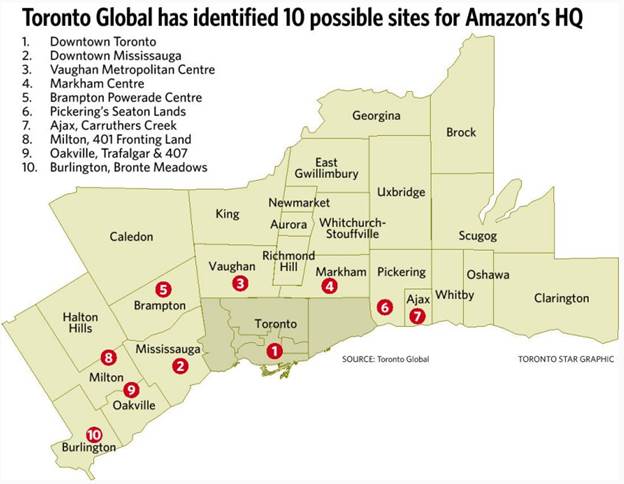
Toronto’s tech talent being used to woo Amazon
More than 100 bids, most of them from U.S. cities and regions, are expected to flood Amazon’s inbox in response to the company’s Sept. 7 call for “Amazon HQ2” proposals. Amazon says the host could win, over time, investments of up to $5 billion and 50,000 jobs.
TheStar.com
Oct. 19, 2017
David Rider
America’s turbulent political climate could doom — or potentially boost — the Toronto region’s shot at landing a mammoth new headquarters of the world’s biggest online retailer.
“When you look at just the pure political situation in the United States, Amazon has to make a major decision,” Janet Ecker, vice chair of the Toronto Global inter-government agency that crafted the regional bid, told reporters Thursday — Amazon’s deadline for bid submissions.
“Are they serious about looking outside of the United States” for a second headquarters? “If they are, we think we have a very, very strong chance. If they’re not . . . ,” Ecker said with a shrug, adding the 185-page bid book, packed with statistics and flattering comparisons with U.S. tech hubs, will serve as Toronto Global’s “calling card” to other companies who could move or expand here.
More than 100 bids, most of them from U.S. cities and regions, are expected to flood Amazon’s inbox in response to the company’s Sept. 7 call for “Amazon HQ2” proposals — a co-headquarters of equal stature with its Seattle complex. Amazon says the host could win, over time, investments of up to $5 billion and 50,000 jobs.

Reuters reported Thursday that U.S. cities are offering Amazon a total of many billions of dollars in tax credits and incentives. New Jersey alone says its pitch for HQ2 in Newark could enrich the retail giant by as much as $7 billion in credits against state and city taxes.
The Toronto region is taking a different tack. The bid offers “no secret promises or sweetheart incentives,” said Toronto Global chief executive Toby Lennox. “Frankly, we feel we don’t need to play that game.”
The core of Toronto’s pitch is the Toronto-Kitchener corridor’s ability to grow tech talent with public education, attract foreign skilled workers, and keep them in the region with internationally recognized virtues including ethnic diversity, culture, sports, public safety, urban vitality and a clean environment.
Mark Cohon, Toronto Global’s chair, pointed to a chart in the bid book showing 51 per cent of Torontonians are foreign-born, and 39 per cent of people across the region, as a huge benefit to a huge and growing company with an insatiable need for highly educated employees.
“We welcome more new immigrants to the Toronto region than Chicago, New York and L.A. combined every year,” Cohon said.
Lennox said the U.S. political climate and President Donald Trump’s immigration policies could work against U.S. cities’ talent capacity.
“We know that Amazon’s issue, and question, over the next little while is their ability to grow their talent base,” he said. “Which is why they can’t do that in the United States, they’re having a hard time doing it which makes us (Amazon’s) logical choice. At the end of the day they’re looking for a pipeline for talent.”
The Toronto region’s bid also argues that, while incentives are not on the table, the dollar difference and corporate tax rates could save Amazon $1.5 billion per year, plus another $600 million in foregone health costs thanks to universal health care.
The bid document does not include a comparison of Toronto house prices to U.S. tech cities, or a map of the city’s subway system. Cohon conceded the city has some disadvantages, but noted Amazon workers could live outside Toronto and then transit expansion is underway.
James Thomson, the Canadian ex-head of Amazon Services, called the Toronto region bid a persuasive document.
“If you look at those numbers,” he said of the many statistics, “Toronto looks like it should be a top 3 contender, all other things being equal.
“There are going to be two very different philosophies fighting against each other to make the choice for Amazon. ‘Do we take the money and run, or do we go somewhere that has a very sizable pipeline for future talent and growth? No city, I would argue, has offered both.
“You can’t just take money and turn it into 1,000 extra engineers. Money doesn’t solve the head-count issue Amazon has right now.”
